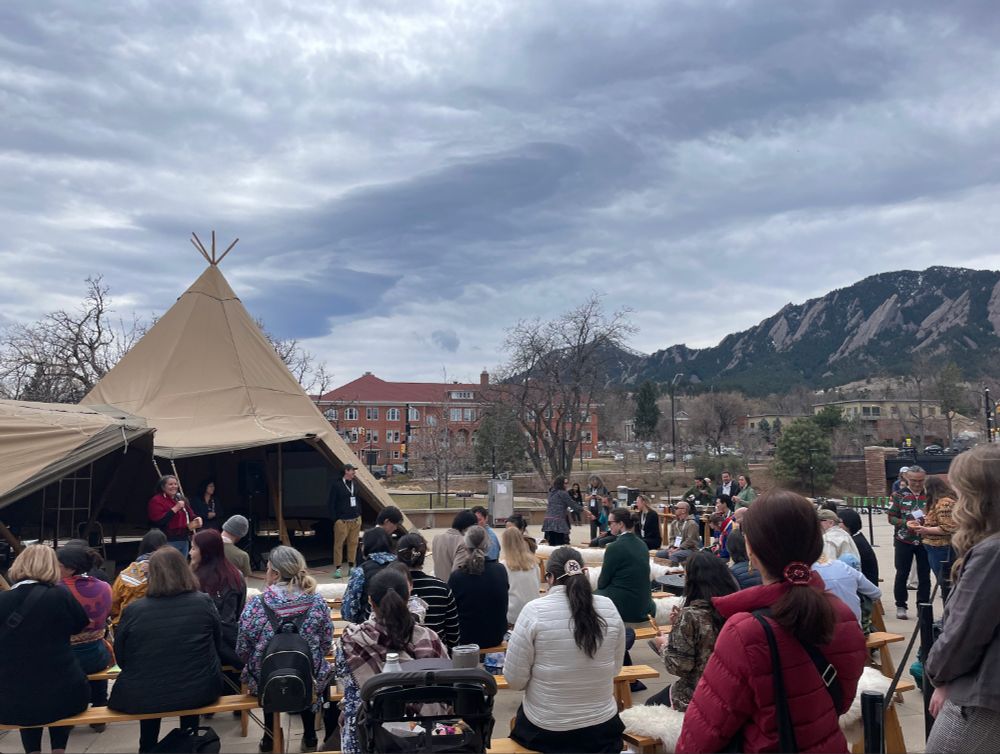I’ve been thinking about
#Arctic Science Summit Week and what it means when people gather, when they gather about science, who can gather and how (or not), and how we move now.
Here’s a longish thread about some of the through-lines I tracked across the meeting.
#ASSW2025 (Feel free to mute!) 🧪🧵
It’s all about the people, esp. early career and future scientists. "The reason it works well is because of people. Doesn’t matter how good your equipment, or how big your datasets: if you don’t have good people and make space for them to do great work, nothing works well,” said one speaker 2/n
This insight was especially poignant as I witnessed many presenters standing in for collaborators and colleagues who had initially planned to share their work but could not attend in person. 3/n
Perhaps science’s replicability make it more resilient to such improvisation and understudy than other forms. But I felt acutely that we were at the hinge point between one era of science meeting in the Lower 48 and the beginning of another one. 4/n
Co-production. It was great to hear the need for and discussion of meaningful co-production of knowledge come up not only in terrific sessions organized around the practice, but as a consensus starting place in most of the plenaries and open Q&As I went to. 5/n
The Past and the Boring (which are not the same thing!) are very important to
#Arctic research and our collective future, and we should make sure to pay attention to them! We ignore them at our peril.
#SciComm 6/n
That might mean making sure we have good metadata & basic data across enough sites to create a pan-Arctic monitoring network to yield region-level insights in near-real time. Or ensuring that teams have ample people-power to track down and process older samples to extend
#data records.
#SciSky 7/n
Minding the Boring comes with tension, of course, bc much science funding is structured around novel hypotheses, not data rescue and processing--making LTERs, Distributed Biological Observatory, and other long-term research initiatives imperative loci for this critical work to take place
#SciSky 8/n
But I heard cross-disciplinary interest in better inventorying existing datasets and processing, digitizing samples as a way to help extend the data record (into the Past) and contextualize new observations in decadal and sometimes longer timescales. 9/n
Apr 8, 2025 23:43Interesting moment at the community meeting of the Distributed Biological Observatory when a participant talked about having to pry open a long-locked cabinet that contained a trove of older samples from prior cruises. In doing so, they were better able to tease out changes and trends 10/n
Personally, this meaningful, cross-disciplinary discussion of
#datarescue and making sense of what we already have was a welcome balm for the AI-steeped discourse being advanced by some of the algos and apps these days.
#SciComm #ASSW2025 11/n
More than prologue, the Past is a useful
#SciComm tool and potentially a decision-making one, too, when we are clear-eyed about its implications. As geologist Julie Brigham-Grette said, researchers use paleo data “to better benchmark how serious these major changes that are happening are.” 12/n
She described changes 55 million years ago, incl. 16-25m of sea level rise over 400 years. “I'd like to see us draw more on those paleo examples to show what the consequences could be,” she said, pointing out that the warming now is happening 10x faster than during the last thermal maximum. 13/n
Have heard Arctic Knowledge-holders & researchers call themselves time travelers before, bridging millennia and ways of knowing to better prepare for the region and planet’s future. But was struck, this time, by Brigham-Grette’s question: What does the future mean to people? Perhaps The Question now
We’re in a moment “to do extended network-building,” said Twila Moon, of
@nsidc.bsky.social. Can we move beyond the “bubbles” western science gets stuck in, find the people and organizations at the next bubble edge and ask: “what do they need, and how would they use that information?” 15/n
Grief was a through-line.
Grief for stolen land
for colleagues who passed
for those not permitted to attend, and others for whom it was not safe
for the losses another record year of warming will mean for this canary region
for the science infrastructure & people power needed to meet this moment
16/
This is subjective, but for me, this was grief-in-motion, a grief-while-there-is-work-to-do. What I’m calling ‘working grief.’ Working grief, as in ‘working draft,’ because the things we are grieving are not final, and can be altered by the work ahead, by community care. 17/n
#Arctic communities and ecosystems have suffered losses; loss is happening now. We must work with and from that knowledge. As with
#permafrost thaw, our past emissions have already guaranteed some thaw in the future, but there’s still time to act. To build resilience, to stabilize more ground. 18/n
And also there was learning. Silence. Curiosity and listening. Humor. Dance. Quyana to the Alaska Native Knowledge-holders who traveled to share their critical Knowledge of the
#Arctic. Who invited everyone to join a traditional Yup’ik dance at the Indigenous pavilion. 19/n
bsky.app/profile/perm...🧵 Our team had a great Arctic Science Summit Week in Boulder, which is located on the traditional territories and ancestral homelands of the Cheyenne, Arapahoe, and Ute, and other Native American nations. Thank you to everyone who joined the conversations about improving Arctic research!
#ASSW2025
Though the warming experiment we’re running is unprecedented in its speed and scale, the connections it reveals and tests have been recognized since time immemorial; they hold.
#Arctic research must continue to prioritize these connections, listen to them, wherever this next era begins or ends. /20
